Table Of Contents:
- What Are NFT Domains and Why Should You Care?
- How NFT Domains Work in the Web3 Ecosystem:
- The Rise of NFT Domains – Trends and Opportunities:
- Top Benefits of Investing in NFT Domains:
- Risks and Challenges of NFT Domains You Need to Know:
- How to Get Started with NFT Domains? A Complete Guide for Beginners and Pros:
- The Future of NFT Domains in Web3 – A Look Ahead:
- Navigating the NFT Domain Market – Tools to Keep You Ahead:
- Conclusion: Are NFT Domains Worth It for Investors and Traders?
- Frequently Asked Questions (FAQs) about NFT Domains in Web3:
- Q1. What exactly are NFT domains?
- Q2. How do NFT domains differ from traditional domains?
- Q3. Can I use NFT domains for cryptocurrency transactions?
- Q4. Are NFT domains compatible with existing platforms and services?
- Q5. How do I purchase an NFT domain?
- Q6. Can I sell or transfer my NFT domain?
- Q7. Are there any risks associated with NFT domains?
- Q8. How do I manage my NFT domain?
- Q9. Can NFT domains be used for hosting websites?
- Q10. Are NFT domains a good investment?
What Are NFT Domains and Why Should You Care?
Hey there! So, you've probably been hearing a lot about NFT domains lately and might be wondering, "What exactly are these, and why should I care?" Let's break it down together.
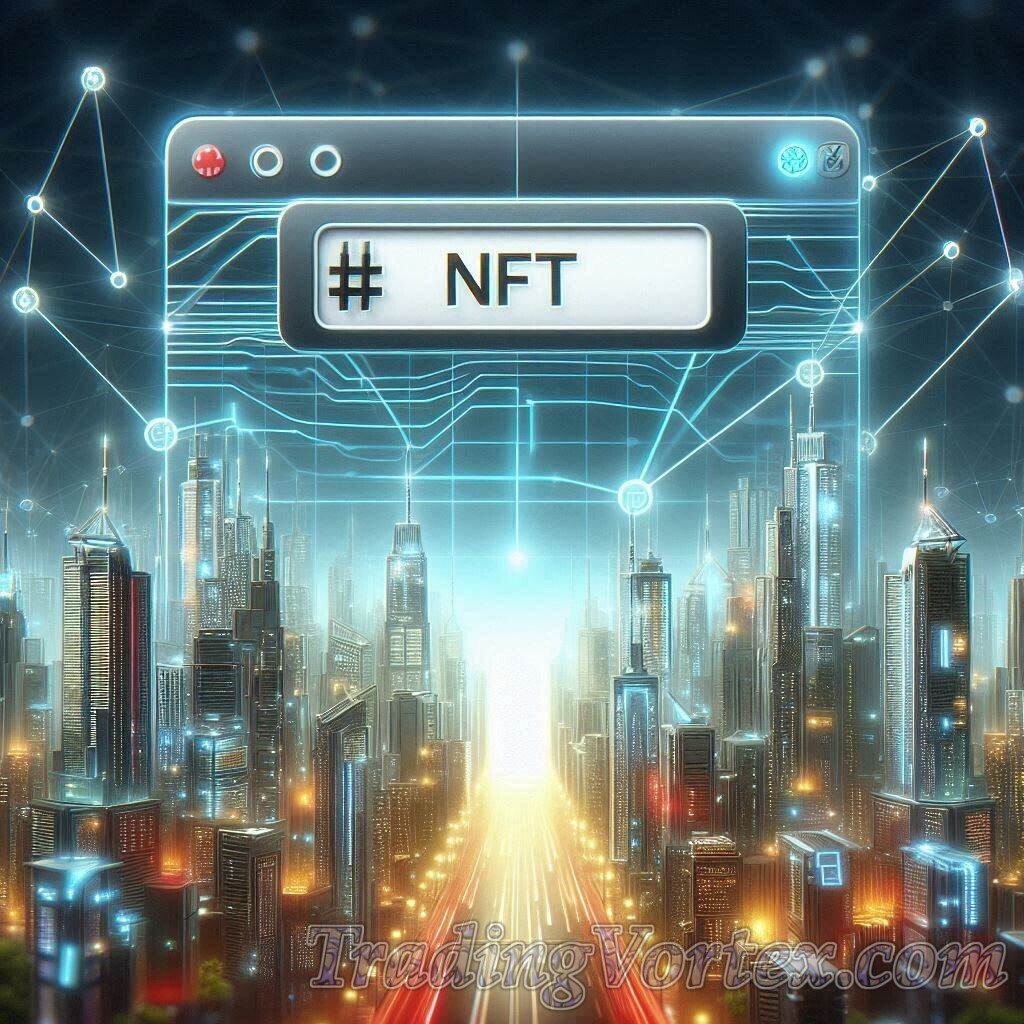
Breaking Down NFT Domains – The Basics:
Why NFT Domains Are the Future of Web3?
Now, why should you, as an investor or trader, pay attention to NFT domains? For starters, they simplify cryptocurrency transactions. Instead of juggling long, complex wallet addresses, you can link your crypto wallet to an easy-to-remember domain name. Imagine sending funds to "yourname.crypto" instead of a confusing string of characters – much more user-friendly, right?
Moreover, NFT domains offer resistance to censorship. Unlike traditional domains that can be seized or censored by authorities, NFT domains are decentralized, giving you full control over your digital presence. This autonomy is a game-changer in today's digital landscape.
In essence, NFT domains are not just a trend; they're paving the way for a more secure, transparent, and user-friendly internet. As we continue to embrace Web3, understanding and investing in NFT domains could position you at the forefront of this digital revolution.
How NFT Domains Work in the Web3 Ecosystem:
If you’ve ever wondered how NFT domains operate or why they’re so hyped in the Web3 world, you’re not alone. These innovative digital assets are shaking up the internet as we know it, offering something entirely new: ownership, security, and versatility wrapped in one sleek package.
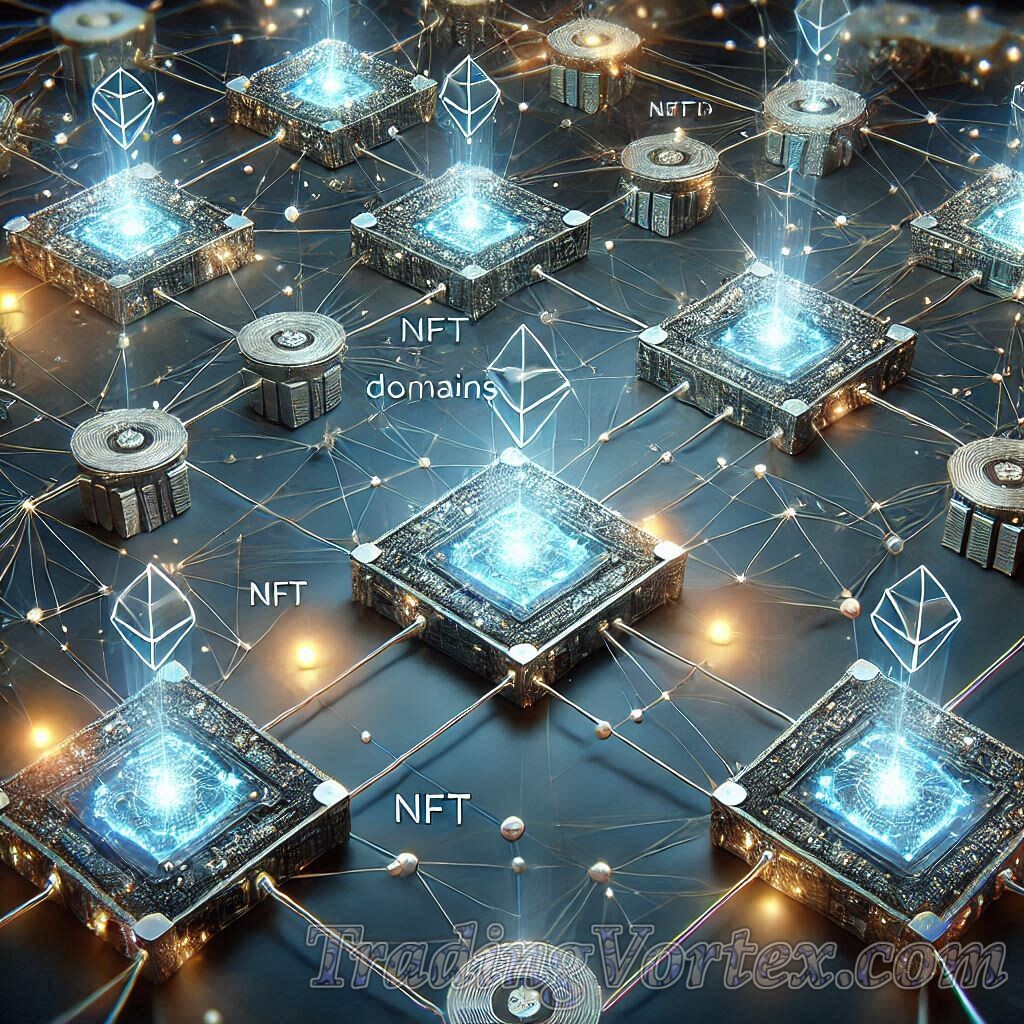
The Technology Behind NFT Domains:
This decentralized approach has a massive advantage: it removes the need for intermediaries. When you buy an NFT domain, it’s yours entirely. Ownership is recorded on the blockchain, which means it’s transparent, tamper-proof, and easily verifiable by anyone, anywhere.
What makes these domains truly unique is that they’re tokenized as non-fungible tokens (NFTs), typically following widely adopted standards like ERC-721 or ERC-1155. Each NFT domain is a one-of-a-kind digital asset, ensuring its scarcity and value. It can be traded, sold, or even used as collateral on blockchain platforms.
Key Features That Differentiate NFT Domains from Traditional Domains:
True Ownership and Permanence:
With traditional domains, you’re essentially renting the name. You pay annual fees to keep the domain active, and if you forget to renew it, someone else can snatch it up. NFT domains, on the other hand, operate differently. Once you purchase one, you own it outright – no renewal fees, no risk of losing it to an oversight. This permanence makes them not only convenient but also a valuable long-term asset.
Simplified Cryptocurrency Transactions:
If you’ve ever sent cryptocurrency, you know how nerve-wracking it can be to copy and paste those long, complicated wallet addresses. A single typo could mean losing your funds forever. NFT domains solve this by acting as human-readable wallet addresses.
Censorship Resistance and Security:
Traditional domains are controlled by centralized registrars and are subject to government regulations, takedowns, and even hacking. NFT domains, however, are stored on decentralized networks, which makes them highly resistant to censorship. No authority can seize your domain or take it offline. This is a game-changer for free speech and secure online presence, particularly in regions with restrictive internet policies.
Integration with Decentralized Applications (dApps):
NFT domains aren’t just your typical website addresses – they’re multifunctional digital assets. They can serve as your identity across Web3 platforms, giving you a unified username for blockchain applications. Whether you’re using a decentralized finance (DeFi) platform, a gaming dApp, or an NFT marketplace, your NFT domain can act as your one-stop identifier.
Customizable and Versatile Use Cases:
An NFT domain isn’t limited to just being a wallet address or website URL. It can also function as:
- A decentralized website hosted on blockchain networks, free from traditional web hosting services.
- A personal or business brand that showcases your digital presence in the Web3 space.
- A platform to display your NFTs, making it a digital gallery or portfolio.
- A key to access exclusive content or events in Web3 ecosystems.
The Bigger Picture: Why NFT Domains Are Transformative?
NFT domains aren’t just another tech trend – they’re a crucial building block of the decentralized internet. They represent a shift toward user-centric control and ownership. By putting digital assets in the hands of individuals rather than centralized entities, NFT domains empower users to take control of their online presence.
For traders and investors, the implications are profound. The ability to trade, hold, and use NFT domains as long-term assets opens up new investment opportunities in a space that’s still in its early stages of adoption. As Web3 continues to grow, these domains will likely play an even greater role in shaping how we interact with the internet.
In short, NFT domains combine the best of blockchain technology with practical use cases that make life easier for crypto enthusiasts, businesses, and casual users alike. They’re not just domains – they’re your digital identity, your investment, and your gateway to the future of the internet.
The Rise of NFT Domains – Trends and Opportunities:
NFT domains have rapidly risen from being a niche concept to becoming a transformative element of the Web3 landscape. They are reshaping how we think about digital ownership, identity, and investment, offering a fresh realm of opportunities for traders, investors, and enthusiasts alike. Let’s break down the trends driving this rise and explore the untapped potential of these blockchain-powered domains.
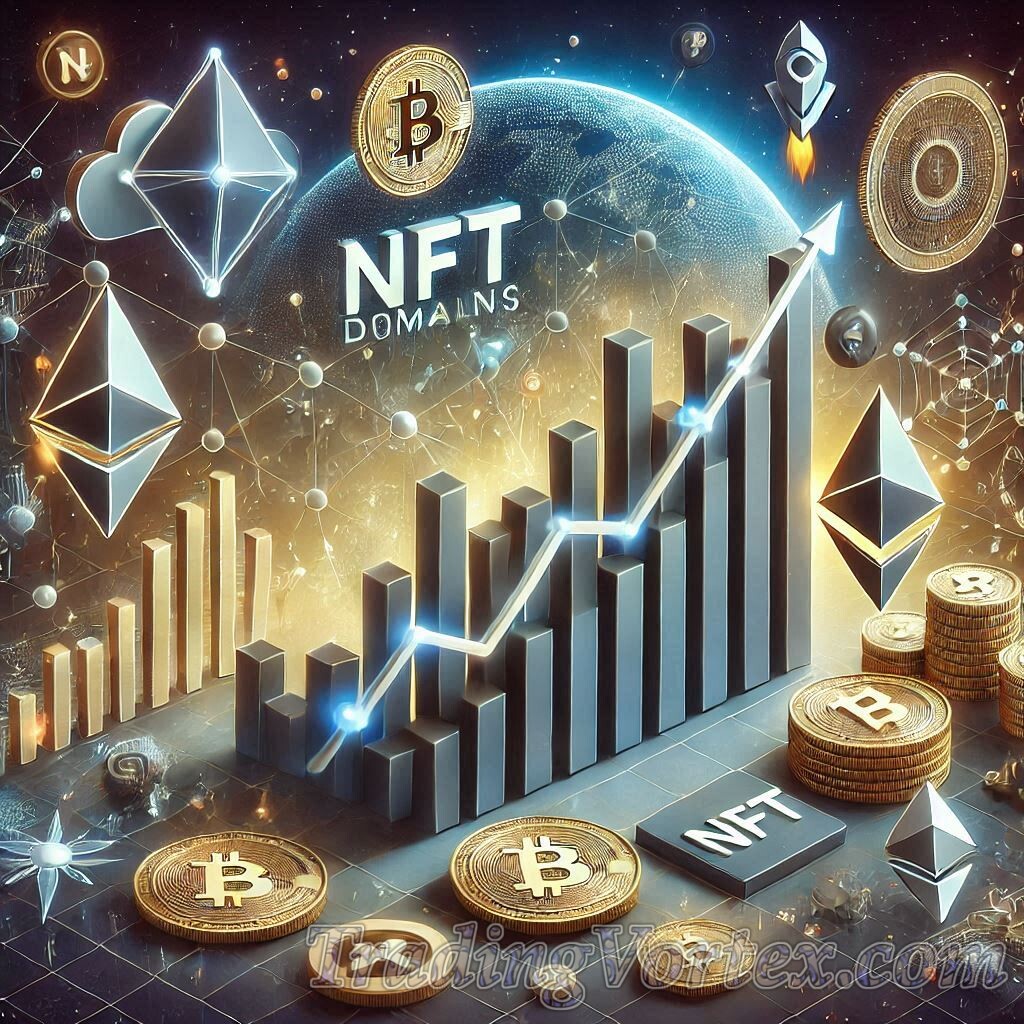
Recent Market Growth and Adoption Rates:
The NFT market, as a whole, has seen explosive growth, and NFT domains are riding that wave. The global NFT market was valued at approximately $17.7 billion in 2021, and projections estimate it could surpass $125 billion by 2027. A compound annual growth rate (CAGR) of over 27% reflects not only the expansion of NFT art and collectibles but also the increasing adoption of utility-driven NFTs, including domains.
NFT domains are gaining particular traction as both individual users and enterprises recognize their value as decentralized digital identities. Businesses are snapping up NFT domains as future-proofed web properties, while individuals see them as gateways to simplify cryptocurrency transactions or establish their presence in the decentralized world.
Additionally, the removal of annual renewal fees associated with traditional domains has made NFT domains particularly attractive. Unlike conventional domains where a lapse in payment can result in losing the domain, NFT domains are a one-time purchase and remain in the owner's wallet indefinitely. This characteristic ensures long-term cost efficiency and peace of mind.
But it’s not just cost savings fueling adoption – it’s also about control. NFT domains provide complete ownership, sidestepping centralized registries that can impose restrictions or reclaim domains. As users grow wary of centralized control, this aspect is drawing widespread attention.
Integration with Blockchain and Smart Contracts:
At the heart of the NFT domain ecosystem lies blockchain technology. NFT domains are typically minted and secured on decentralized networks like Ethereum, Polygon, or Binance Smart Chain. This decentralization makes them immune to censorship or seizure, offering users a robust, reliable way to secure their online presence.
Smart contracts take things further by automating critical processes, such as minting, transferring, or resolving disputes related to domain ownership. Once programmed, these contracts operate autonomously, ensuring that the terms governing a domain remain immutable. The absence of intermediaries not only reduces costs but also bolsters security.
Furthermore, NFT domains interact seamlessly with the broader Web3 ecosystem. They can integrate with decentralized applications (dApps), wallets, and marketplaces, serving as a universal identifier across platforms. A single NFT domain can act as a crypto wallet address, a business card, and a personal website – all in one.
Opportunities for Investors and Traders:
The rapid rise of NFT domains has opened up an array of opportunities for savvy investors and traders. Whether you're looking to diversify your portfolio or capitalize on the early stages of this technology, the possibilities are vast:
Digital Real Estate Speculation:
Just like premium real estate in the physical world, early investment in NFT domains can lead to substantial appreciation over time. Domains with desirable names, keywords, or phrases are already being snapped up and sold for significant profits. Owning a short, brandable domain like "crypto.exchange" or "art.eth" could pay off as businesses seek such assets for their Web3 expansion.
Branding in the Decentralized Era:
Businesses are recognizing the need to establish themselves in Web3, and NFT domains offer a competitive edge. Investors can capitalize on this trend by acquiring domains related to popular industries, products, or services. Selling such domains to brands looking to expand their digital footprint could prove lucrative.
Utility for Traders:
NFT domains simplify cryptocurrency transactions, making them an ideal tool for traders. Instead of juggling multiple wallet addresses, traders can manage their digital assets under a single, user-friendly domain, saving time and reducing errors.
Early Adoption Benefits:
As the Web3 ecosystem matures, the demand for NFT domains is likely to increase. Early adopters have a chance to secure prime digital real estate before the market becomes saturated. Whether you aim to hold, trade, or develop your domains, being an early player provides an edge.
Emerging Trends in NFT Domains:
The rise of NFT domains is not static; new trends are shaping the landscape every day:
- Integration with AI and IoT: As Web3 evolves, NFT domains may play a role in enabling seamless communication between artificial intelligence systems and the Internet of Things (IoT). A single NFT domain could act as a hub for interconnected devices.
- Gaming and Virtual Worlds: NFT domains are being used in virtual reality and gaming environments, where they function as personalized spaces or portals in metaverse platforms.
- Decentralized Autonomous Organizations (DAOs): DAOs are starting to leverage NFT domains as branding and communication tools. A DAO can establish its identity and host decentralized content using a single domain.
The Bigger Picture:
NFT domains represent more than just a trendy innovation – they’re the building blocks of a decentralized internet. By combining blockchain technology, user-friendly functionality, and practical utility, NFT domains are carving out their niche in the Web3 revolution.
For investors and traders, the rise of NFT domains signals an unprecedented opportunity to get involved in the early stages of a transformative digital trend. Whether you're speculating on high-demand domains, using them as investment assets, or leveraging their versatility for personal or business use, the potential is vast and exciting.
Ultimately, NFT domains are more than a fad – they’re a glimpse into the future of how we’ll navigate and own the internet in a Web3-driven world. If you haven’t started exploring this space yet, now might be the perfect time to dive in.
Top Benefits of Investing in NFT Domains:
NFT domains are more than just digital assets; they are gateways to the decentralized web, blending innovation, utility, and investment potential. For traders and investors, understanding the key benefits of NFT domains can unlock a world of opportunities in this rapidly evolving space. Let’s break down why these domains are worth your attention.
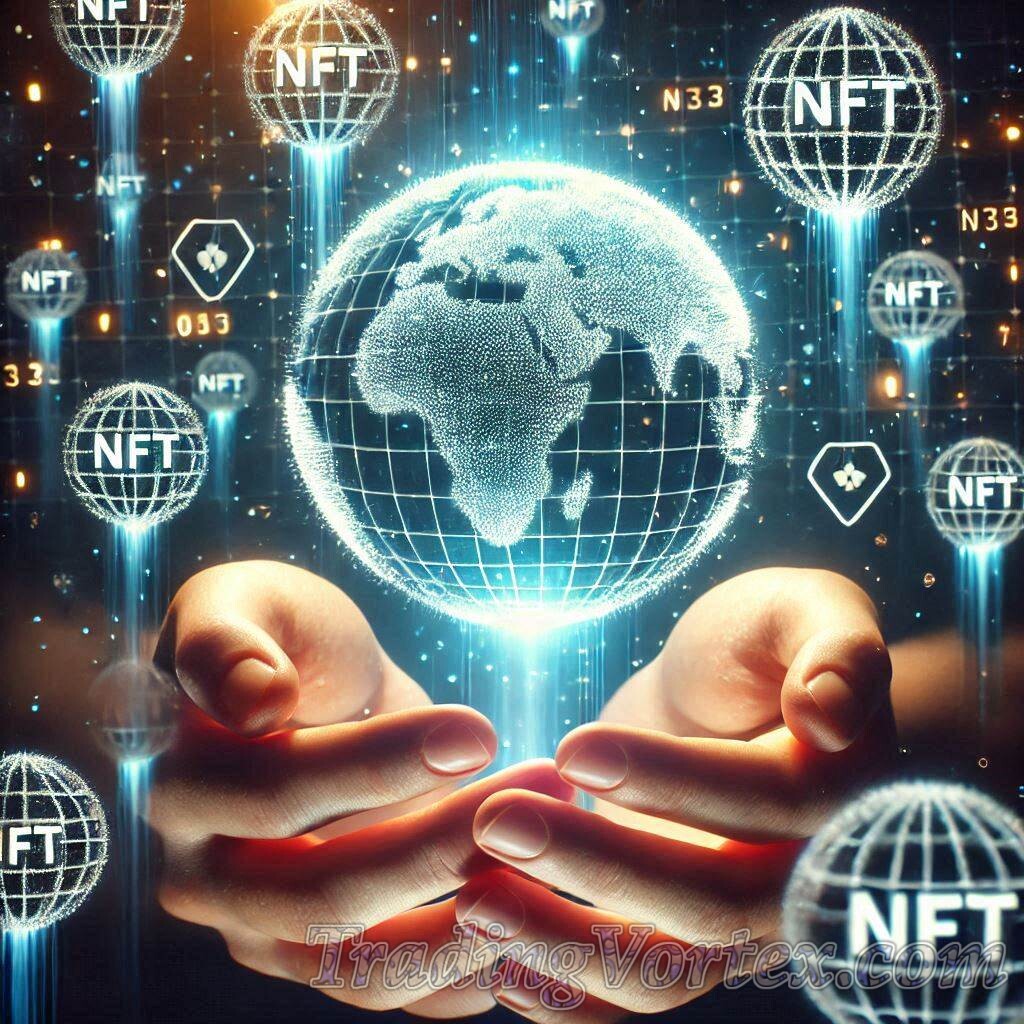
Ownership, Transparency, and Security:
True Ownership – Putting You in Control:
With NFT domains, you aren’t renting a domain name from a centralized registrar like you would with traditional domains. Instead, you own it outright. Once an NFT domain is minted and resides in your crypto wallet, it’s yours permanently – no annual renewal fees, no risk of a centralized authority revoking it. This level of ownership provides peace of mind and eliminates the frustrations often associated with legacy systems.
Transparency – Built Into the Blockchain:
One of the standout features of NFT domains is their transparency. Every transaction, from minting to transferring ownership, is recorded on the blockchain. This means anyone can verify the authenticity and ownership history of a domain in real-time. Whether you’re a buyer, seller, or end user, this level of transparency builds trust and reduces the risk of fraud.
Security – Safeguarded by Decentralization:
Blockchain technology offers unparalleled security for NFT domains. Unlike traditional domains, which are vulnerable to hacking or domain hijacking, NFT domains benefit from the decentralized nature of the blockchain. There’s no single point of failure, making them significantly more resilient to attacks.
Additionally, smart contracts automate ownership transfers and other processes, reducing the likelihood of human error or malicious interference. For investors, this security framework is a major draw, especially in a digital age where cyber threats are ever-present.
Monetization Potential and Long-Term Value:
Appreciation and Flipping Opportunities:
Just like traditional real estate or premium web domains, NFT domains can appreciate significantly in value over time. Investors who secure short, memorable, or industry-specific NFT domains early can later sell them at a premium as demand grows.
Leasing and Passive Income:
Cross-Platform Utility:
Unlike traditional domains that primarily serve as website addresses, NFT domains have a broad range of applications in the Web3 ecosystem. They can function as:
- Crypto Wallet Addresses: Replace long, complicated wallet strings with human-readable names like “johndoe.eth”.
- Decentralized Website URLs: Host censorship-resistant websites.
- Universal Logins: Use your domain as a single sign-on for dApps, streamlining your online interactions.
This multi-purpose functionality not only increases the practical value of NFT domains but also enhances their appeal to a wide audience, from crypto enthusiasts to businesses entering the blockchain space.
Why Now Is the Time to Invest:
The NFT domain market is still in its early stages, meaning there’s plenty of untapped potential for growth. As blockchain technology becomes more integrated into everyday life, the utility and demand for NFT domains will only increase.
Here are some compelling reasons to consider investing now:
- First-Mover Advantage: Early investors have access to the most desirable domains at relatively low prices.
- Growing Adoption: With more individuals and businesses entering Web3, the demand for intuitive and brandable domains is skyrocketing.
- Future-Proof Technology: NFT domains align with the broader shift towards decentralization, making them a forward-looking investment.
Key Takeaways:
Investing in NFT domains is more than just a trend – it’s a strategic move in the Web3 revolution. With benefits like true ownership, enhanced security, transparency, and significant monetization potential, these domains are poised to play a major role in the decentralized internet.
Whether you’re a seasoned investor looking to diversify your portfolio or a newcomer exploring blockchain opportunities, NFT domains offer an exciting avenue to explore. The key is to act early, do your research, and secure your spot in this transformative digital landscape. After all, in the world of Web3, owning the right domain could be your ticket to future success.
Risks and Challenges of NFT Domains You Need to Know:
NFT domains are a promising area of investment within the broader Web3 and blockchain ecosystem, but like any new frontier, they come with their share of risks. As with any form of investment, it’s essential to approach NFT domains with an informed mindset. Let’s take a deeper look at some of the key risks and challenges that investors should be aware of when considering NFT domains.
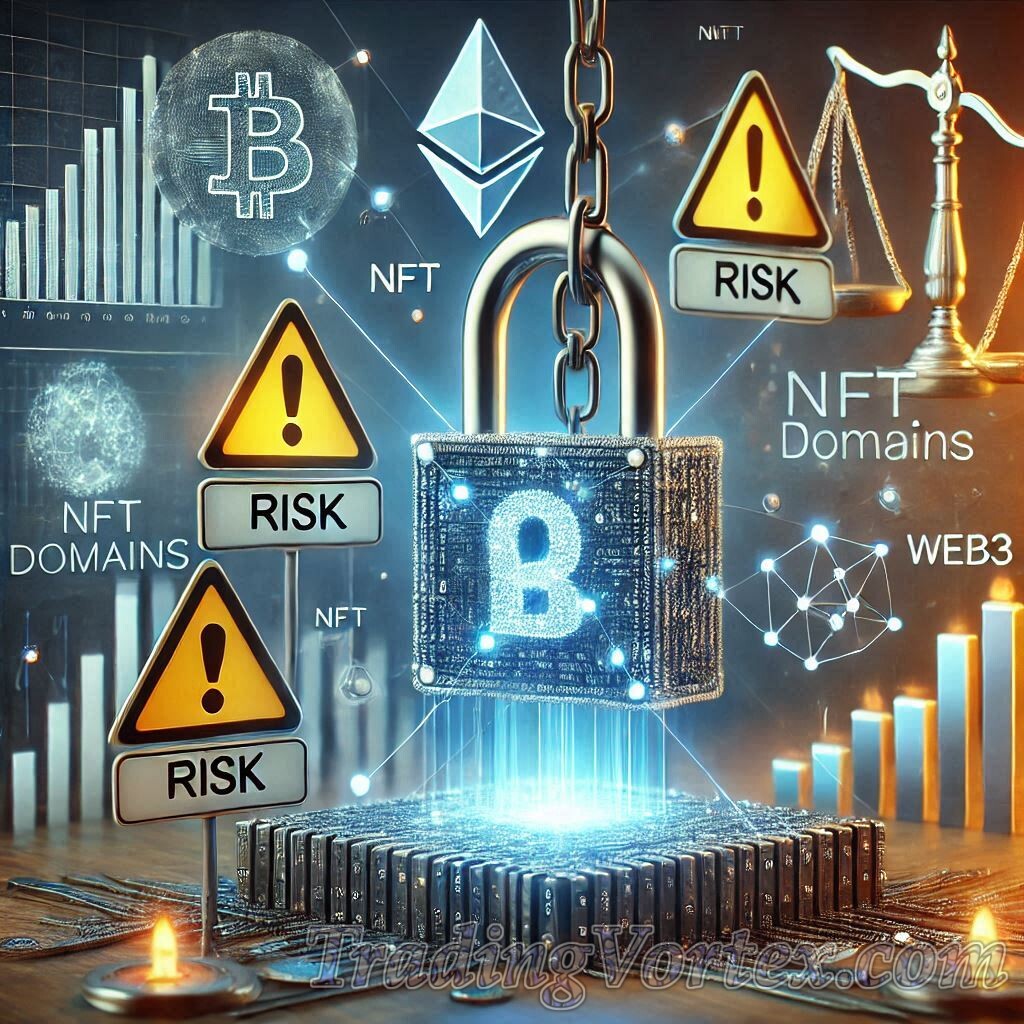
Volatility and Market Speculation:
The Roller Coaster of NFT Domain Prices:
If you're familiar with the world of crypto, you're probably aware of how volatile markets can be, and NFT domains are no exception. The price of a domain can fluctuate wildly in response to market sentiment, technological trends, or broader shifts in the economy. One day, you could be holding an NFT domain that's valued at a small fortune, only to see the price drop drastically the next day.
Speculative Nature of NFT Domains:
Many NFT domains are purchased with the hope that their value will increase as the Web3 ecosystem grows. However, predicting which domains will rise in value is extremely speculative. A domain that seems like a steal today could lose its luster tomorrow as the market shifts. Factors like shifts in blockchain technology, new decentralized applications, or even societal trends can affect the desirability of specific domains.
Just like any other speculative asset (such as stocks or cryptocurrencies) there’s a lot of guesswork involved in predicting the success of your domain investment. This uncertainty can make NFT domains an exciting yet risky venture. It's essential to do as much research as possible to identify the types of domains with long-term growth potential.
Legal and Regulatory Risks in the NFT Space:
Unclear Regulatory Environment:
Perhaps one of the most pressing concerns surrounding NFT domains is the uncertainty in regulation. Globally, the legal frameworks governing NFTs remain in flux, with countries and regulatory bodies struggling to define how to treat these digital assets. In places like the U.S., the SEC has raised questions about whether certain NFTs could be classified as securities, adding an element of risk for both buyers and sellers.
Without clear regulations, there’s a chance that NFT domains could face retroactive scrutiny, or even penalties, as the legal system catches up with the fast-moving blockchain space. In some cases, investors could find themselves in legal trouble if they unknowingly violate emerging regulations. Being informed about the shifting regulatory landscape and seeking legal advice before making significant investments is crucial.
Intellectual Property (IP) Rights:
When purchasing an NFT domain, it’s important to remember that ownership of the domain itself doesn’t always confer full intellectual property rights to any content associated with it.
This distinction can sometimes lead to legal gray areas, especially if a domain owner attempts to use a name that infringes on someone else’s intellectual property. Moreover, in cases where NFT domains are used for hosting decentralized websites or applications, determining copyright or trademark ownership can become even more complicated. As the NFT space matures, it’s likely that more clarity on intellectual property issues will arise, but until then, owners of NFT domains must tread carefully to avoid potential lawsuits.
Scams, Counterfeit NFT Domains, and Fraudulent Practices:
As with any emerging market, the NFT domain space has attracted a number of bad actors looking to take advantage of unsuspecting investors. Scams can take many forms: from fake NFT domains being sold on shady platforms to individuals selling domains they don’t own in the first place. Furthermore, the anonymity of blockchain transactions makes it easier for fraudsters to operate.
To avoid these risks, it’s essential to conduct thorough due diligence on the platforms you’re using to purchase or sell NFT domains. Always verify that the domain you're considering is being sold by a legitimate owner, and ensure the platform you're using has robust security protocols in place to protect your investment. Researching the reputation of any marketplace or domain seller is also critical, as many scams have occurred on less-established platforms.
Mitigating the Risks of NFT Domain Investments:
While the risks surrounding NFT domains are real, there are several ways to mitigate them and ensure that you’re making informed decisions in this rapidly evolving market.
Diversify Your Portfolio:
Much like with traditional investments, diversification is a key strategy to minimize risk in the NFT domain space. Don't put all your funds into a single domain or a narrow range of domains. Instead, consider spreading your investments across a variety of domain names, blockchain ecosystems, and types of digital assets. By doing so, you reduce the impact that any one failed investment could have on your overall portfolio.
Stay Informed and Educated:
The world of NFT domains is evolving at breakneck speed. New trends, regulatory changes, and technological advancements can pop up at any moment. By staying informed through reputable news sources, joining relevant communities, and keeping tabs on the Web3 ecosystem, you can better anticipate shifts in the market and adjust your strategy accordingly.
Legal Due Diligence:
Before purchasing any NFT domain, it’s essential to understand the intellectual property landscape. Ensure that the domain you’re purchasing does not violate any trademarks or copyrights that could potentially lead to legal issues. Additionally, consult with legal professionals who specialize in NFTs or blockchain technology to ensure that your investment complies with all applicable regulations.
Carefully Vet the Platforms and Projects:
Always use trusted, reputable platforms when buying or selling NFT domains. Look for established NFT marketplaces with solid security measures, positive user reviews, and transparent processes. Verify that the project behind the domain is legitimate and that the blockchain it’s hosted on is secure.
Understand the Technology:
NFT domains are built on blockchain technology, which comes with its own set of risks and nuances. While blockchain’s decentralized nature offers enhanced security, it’s not impervious to risks such as network vulnerabilities, smart contract bugs, or scalability issues. Take time to understand the technical side of NFT domains, including the blockchain protocols they’re built on, and how they may evolve over time.
Final Thoughts – Proceed with Caution and Confidence:
NFT domains have massive potential, but like all investments, they come with risks. By understanding the challenges, doing thorough research, and staying vigilant, you can significantly reduce those risks and position yourself for success. Approach NFT domains not as a quick-money scheme, but as a long-term investment in the future of the decentralized internet.
How to Get Started with NFT Domains? A Complete Guide for Beginners and Pros:
So, you've heard the hype about NFT domains and you’re ready to jump in, but you're not sure where to start. Don’t worry – you’re not alone. The world of NFT domains can seem overwhelming at first, but with the right guidance, it’s totally manageable. Here’s a detailed and step-by-step guide that covers everything you need to know to get started.
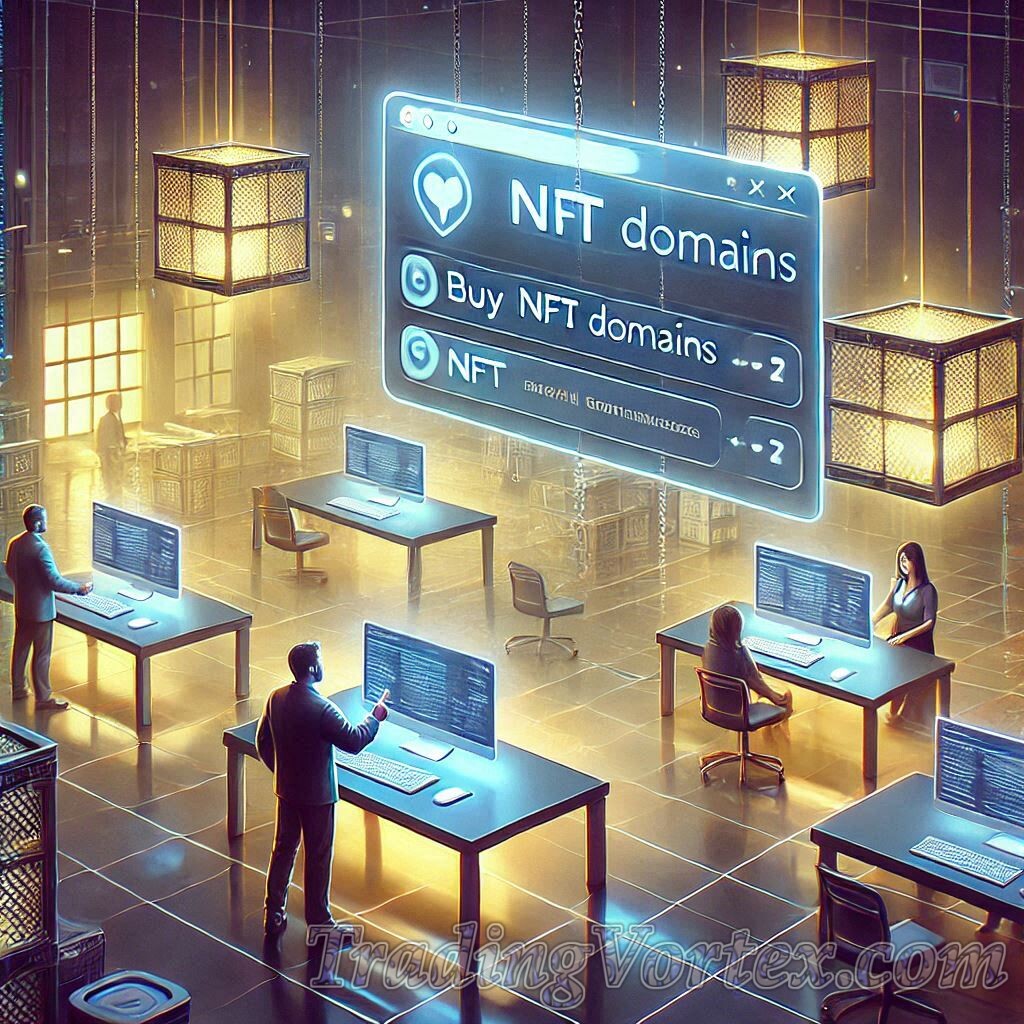
Understanding NFT Domains – The Basics:
Before diving in, it’s important to understand what NFT domains actually are.
NFT domains are blockchain-based domain names that use Non-Fungible Token (NFT) technology to give you ownership of a domain. These are digital assets that exist on the blockchain, and just like NFTs, they are unique and can’t be duplicated. Unlike traditional domain names (which are registered through centralized authorities), NFT domains give you full ownership, control, and the ability to transfer, sell, or rent your domain at will.
What makes NFT domains particularly exciting is that they are decentralized, meaning you don’t need to rely on a third-party registrar like GoDaddy to manage or renew your domain. You own it directly through your cryptocurrency wallet. This gives NFT domains a level of freedom and flexibility that traditional domains can’t offer.
Choosing the Right Platform to Buy NFT Domains:
To get your hands on an NFT domain, you'll need to use a marketplace or platform that specializes in these assets. Here's a rundown of some of the most popular platforms to explore:
- Unstoppable Domains: This platform is a leader in the NFT domain space, offering blockchain-based domain names with extensions like
.crypto,.nft, and.zil. It’s a great place to start if you’re looking for a simple, user-friendly experience, and it integrates seamlessly with decentralized websites. - OpenSea: As the largest NFT marketplace, OpenSea is a great option for finding NFT domains. They support various extensions and allow you to buy, sell, and trade NFT domains on the Ethereum blockchain.
- ENS (Ethereum Name Service): ENS is the go-to platform for Ethereum-based domain names. It’s particularly popular for those looking to link their domain to their Ethereum wallet, simplifying crypto transactions.
- Quik.com: A newer platform that’s quickly gaining traction. It allows you to purchase domains on both the Ethereum and Binance Smart Chain networks, giving you more flexibility when building your digital presence.
- Fleek: Although primarily focused on web hosting, Fleek is worth checking out for anyone wanting to build a decentralized website on their NFT domain. They provide seamless integration with NFT domains for an easy setup.
Setting Up a Digital Wallet for NFT Domain Transactions:
To interact with NFT domains, you’ll need a digital wallet that supports cryptocurrency and interacts with blockchain-based assets. Here are a few popular wallets you can use:
- MetaMask: A widely used browser extension and mobile app that works with Ethereum-based NFTs and assets. It's an essential tool for buying, selling, and transferring NFT domains.
- Trust Wallet: Trust Wallet supports multiple blockchains and can interact with decentralized applications (dApps). It's ideal for users who plan on exploring multiple NFT domain platforms.
- Coinbase Wallet: A user-friendly option for beginners. It integrates seamlessly with Coinbase’s exchange and offers simple transactions for NFT domain purchases.
- Ledger Nano X: For added security, a hardware wallet like Ledger Nano X is a great choice. It provides offline storage for your NFT domains and digital assets.
Make sure to choose a wallet that’s compatible with the platform you're using to purchase your NFT domain.
How to Buy an NFT Domain:
Once you’ve set up your wallet and chosen a platform, you’re ready to purchase your first NFT domain. Here’s a simple, step-by-step process:
- Search for Available Domains: Use the search bar on the platform to look for available NFT domains. Keep in mind that popular names might already be taken, so try being creative or consider using a unique extension (e.g.,
.nft,.eth,.zil). - Select Your Domain: Once you find a domain you like, select it to check availability and pricing. Keep in mind that prices can range from affordable to quite pricey, depending on the demand for the domain name.
- Connect Your Wallet: Connect your crypto wallet to the platform (e.g., MetaMask, Trust Wallet, etc.). Ensure that your wallet has sufficient funds for the purchase. Most platforms accept ETH (Ethereum) for NFT domain transactions, but some also support other currencies like BTC or USDT.
- Make the Purchase: Once your wallet is connected and you're ready to proceed, follow the platform’s prompts to complete the purchase. This typically involves confirming the transaction within your wallet.
- Confirm Your Ownership: After the transaction is complete, the domain will be transferred to your wallet, confirming that you now own the NFT domain. This is a key benefit of NFT domains – you have full ownership and control over the domain.
Managing Your NFT Domain:
After you’ve secured your NFT domain, managing it is relatively simple, but there are a few options you can explore:
- Create a Decentralized Website: One of the most exciting things about owning an NFT domain is that you can host a decentralized website on it. Platforms like IPFS (InterPlanetary File System) and Fleek allow you to host websites that are fully decentralized and can be accessed using your NFT domain. This gives you more control and removes the need for centralized hosting services.
- Simplify Crypto Transactions: NFT domains are also super useful for simplifying cryptocurrency transactions. Instead of sending payments to long, complex wallet addresses, you can simply share your NFT domain (e.g.,
YourName.crypto) as a receiving address. This makes it much easier to handle crypto transactions, especially for those new to the space. - Transfer or Resell: If you ever decide to sell or transfer your NFT domain, you can easily do so via the platform where you purchased it or other compatible marketplaces. The beauty of NFT domains is that they are assets you can trade freely, just like other NFTs.
Staying Informed and Updated:
NFT domains are a rapidly evolving market, and to ensure you’re making the most out of your investments, you’ll want to stay informed about the latest trends, tools, and platform updates. Here’s how you can stay ahead:
- Follow Industry News: Subscribe to newsletters, blogs, and news sites dedicated to the world of NFTs, Web3, and blockchain technology. This will keep you in the loop about new NFT domain developments, partnerships, and market trends.
- Engage with Communities: Join online communities like Reddit, Discord, or Twitter to connect with other NFT domain enthusiasts. These spaces are great for learning from others, sharing tips, and discussing the latest in the NFT domain world.
- Experiment with New Features: As platforms evolve, they often introduce new features and updates that can help you better manage your NFT domains. Stay curious and explore what’s new to maximize the utility of your domains.
Final Thoughts – Embrace the Future with NFT Domains:
Getting started with NFT domains is a thrilling experience, especially if you’re looking to stake your claim in the decentralized internet of the future. Whether you’re buying one to simplify your crypto transactions, creating a decentralized website, or simply investing in digital real estate, NFT domains offer endless opportunities.
Remember, the key to success is to start small, do your research, and stay up to date. With a little patience and the right tools, you’ll be well on your way to mastering the world of NFT domains. Happy hunting!
The Future of NFT Domains in Web3 – A Look Ahead:
The world of NFTs has already revolutionized digital art, collectibles, and virtual assets, but there’s another exciting frontier on the rise: NFT domains. These unique digital assets, which allow users to own a piece of the decentralized internet, are transforming the way we think about online presence and ownership. But what does the future hold for NFT domains in Web3?
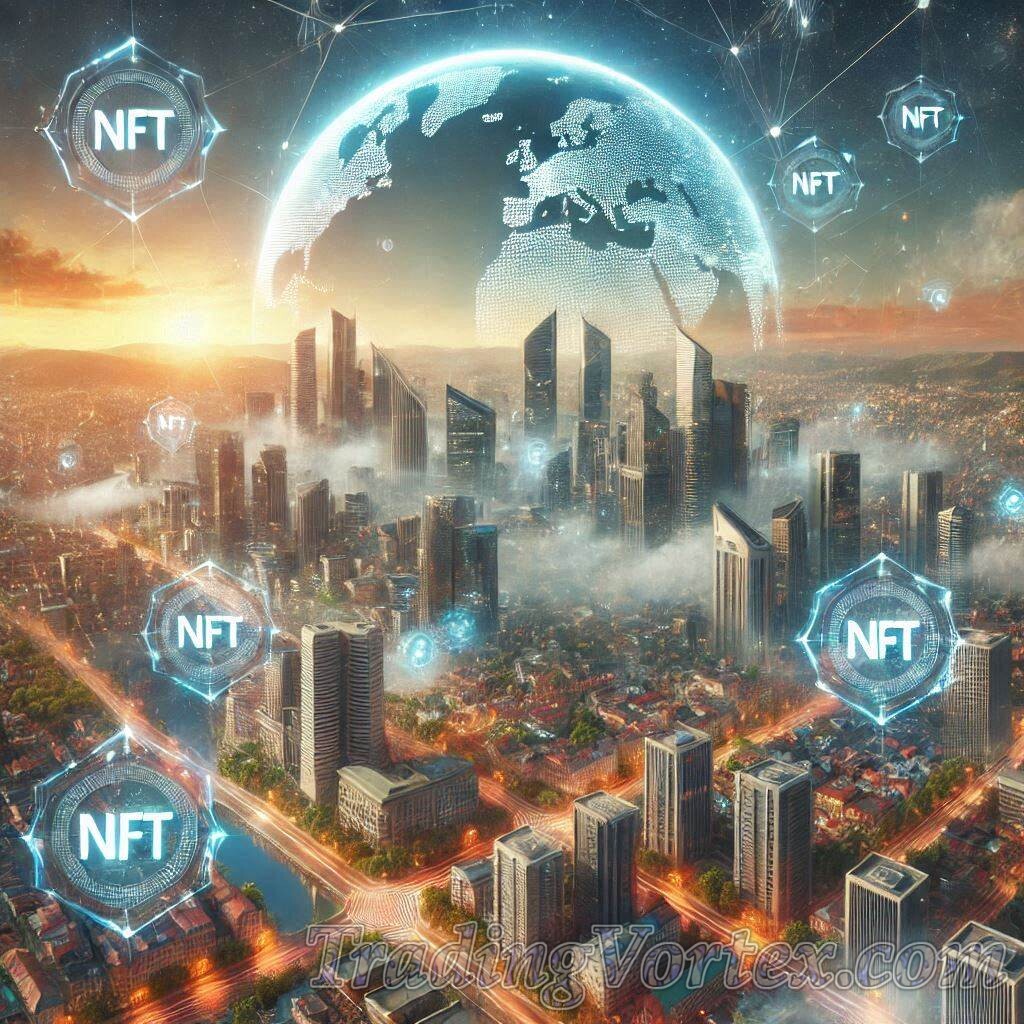
Let’s take a deep dive into the trends and opportunities shaping the future of NFT domains and how the evolution of Web3 will drive the growth of these digital assets.
Predictions for the NFT Domain Industry:
The Rise of Decentralized Identity Systems:
As Web3 continues to gain traction, NFT domains are expected to play a key role in the development of decentralized identity systems (DID). Unlike traditional Web2 identities that are controlled by centralized entities (think Google or Facebook), decentralized identity systems allow users to own and manage their personal data. NFT domains will become a cornerstone of this shift, offering individuals control over their online identity without the need for intermediaries.
- Your Identity, Your Control: By linking your NFT domain to your digital identity, you will be able to manage online transactions, interactions, and profiles with full autonomy. The days of relying on social media giants to verify your existence will soon be a thing of the past.
- Identity across dApps: Your NFT domain will serve as a unique identifier across decentralized applications (dApps), ensuring that your online persona is consistent across the Web3 landscape. Think of it as your digital passport – your identity in the decentralized world!
AI-Powered Integration with NFT Domains:
We’re not just talking about NFTs in the context of art and collectibles anymore. The future is looking toward AI-powered integration. As artificial intelligence continues to evolve, we’re likely to see NFT domains incorporating AI-driven functionalities that enhance user experience and engagement. These could include:
- Personalized Web Experiences: NFT domains could dynamically change based on the user’s preferences, actions, or interactions. Imagine browsing an NFT-based website where the content adapts in real-time to suit your interests.
- AI as a Content Curator: With AI integration, NFT domains could serve as platforms where AI curates content, manages personal data, and automates online tasks like networking and transactions.
NFT Domains as a Bridge Between Web2 and Web3:
While Web3 has gained significant momentum, most of the internet still operates on Web2 technologies. NFT domains are set to become the bridge that connects the two worlds. As more businesses and individuals explore the Web3 space, NFT domains will allow users to:
- Create Decentralized Websites: Instead of relying on traditional domain providers like GoDaddy, users will be able to host their websites directly on the blockchain. These sites will be censorship-resistant and more secure, giving users control over their content and privacy.
- Seamlessly Transition from Web2 to Web3: For those not yet fully immersed in Web3, NFT domains will make the transition easier. Whether you’re a business, brand, or individual, owning an NFT domain will act as your entry point into the decentralized web.
Monetization Opportunities for NFT Domains:
NFT domains aren't just an investment in digital real estate – they’re also a potential revenue stream. As the market for NFT domains grows, so will the opportunities to monetize your domain:
- Selling or Leasing Your NFT Domains: Just like traditional domains, you can buy, sell, or lease NFT domains. Some early investors are already flipping domains for huge profits, and as the Web3 ecosystem grows, the demand for NFT domains will likely increase, further driving up their value.
- Hosting Revenue: As more people build on decentralized web platforms, there’s an opportunity for domain owners to earn money by offering hosting services or building dApps on their domains.
- Branding and Marketing: Businesses will want to get in on the action too. Imagine securing a high-demand NFT domain, like “
cryptotrading.nft” or “blockchainstartups.nft”. You could potentially lease or sell the domain to companies looking to establish their Web3 presence.
How Web3 Evolution Will Impact NFT Domains:
Web3 is all about decentralization, privacy, and empowering individuals. These principles will shape the future of NFT domains in profound ways:
Decentralized Ownership as the New Norm:
The most significant impact Web3 will have on NFT domains is the shift toward true digital ownership. With Web3, users can have complete ownership over their assets, and that includes their NFT domains. Unlike traditional web domains that are leased from central authorities, NFT domains are fully owned by the holder. This means:
- No Third-Party Control: There will be no middleman like ICANN controlling your domain. Your NFT domain is yours and only yours, giving you more freedom and autonomy over your digital assets.
- Smart Contracts for Governance: Web3 technology will use smart contracts to manage NFT domain transactions, ensuring that the rules are enforced automatically without any human interference. This makes the process faster, more secure, and transparent.
Interoperability Across dApps:
As Web3 evolves, NFT domains will serve as the bridge for interoperability between various decentralized applications. Right now, the Web3 space can feel fragmented, with different apps operating in silos. NFT domains will enable a more unified experience where:
- Single Sign-On (SSO) Across Platforms: Imagine using your NFT domain to seamlessly sign into multiple dApps without the need for creating new usernames and passwords every time.
- Cross-Platform Integration: As more dApps are built on various blockchains (Ethereum, Solana, etc.), NFT domains will facilitate cross-platform communication and interaction, making the Web3 experience much smoother.
Integration with Decentralized Finance (DeFi):
DeFi is one of the most exciting sectors in Web3, and NFT domains are poised to play a big role in its growth. As Web3 matures, NFT domains will integrate directly with DeFi protocols, allowing users to:
- Use Domains as Collateral: Similar to how you can use physical assets as collateral in traditional finance, NFT domains could be used to secure loans or participate in DeFi lending platforms.
- Access to Blockchain Financial Services: As your digital identity becomes tied to your NFT domain, you could gain automatic access to decentralized financial services like staking, yield farming, or liquidity pools.
Expanded Use Cases Beyond Websites:
Right now, NFT domains are primarily used for website hosting, but the possibilities for these domains are limitless. As the Web3 ecosystem expands, we will see new and exciting use cases for NFT domains, including:
- Digital Identity Management: Your NFT domain could become your digital passport, helping you manage your online presence across all platforms while protecting your privacy.
- Exclusive Access to Content and Services: NFT domains could be tied to exclusive memberships or provide access to premium content, such as gated communities, private events, or special offers in the Web3 space.
Final Thoughts on the Future of NFT Domains in Web3:
The future of NFT domains is bright, with the potential to completely reshape how we interact with the internet. As Web3 continues to evolve, NFT domains will become essential tools for establishing and managing digital identities, creating new revenue streams, and unlocking opportunities in the decentralized world.
Whether you’re a savvy investor looking to buy valuable digital real estate, a business looking to establish a Web3 presence, or simply an individual curious about what comes next in the digital world, NFT domains will play a crucial role in your journey. Keep an eye on this space because the best is yet to come!
Navigating the NFT Domain Market – Tools to Keep You Ahead:
Staying ahead in the NFT domain market requires using the right tools. Whether you’re an experienced trader or just starting out, having access to comprehensive analytics and market insights will help you make informed decisions.
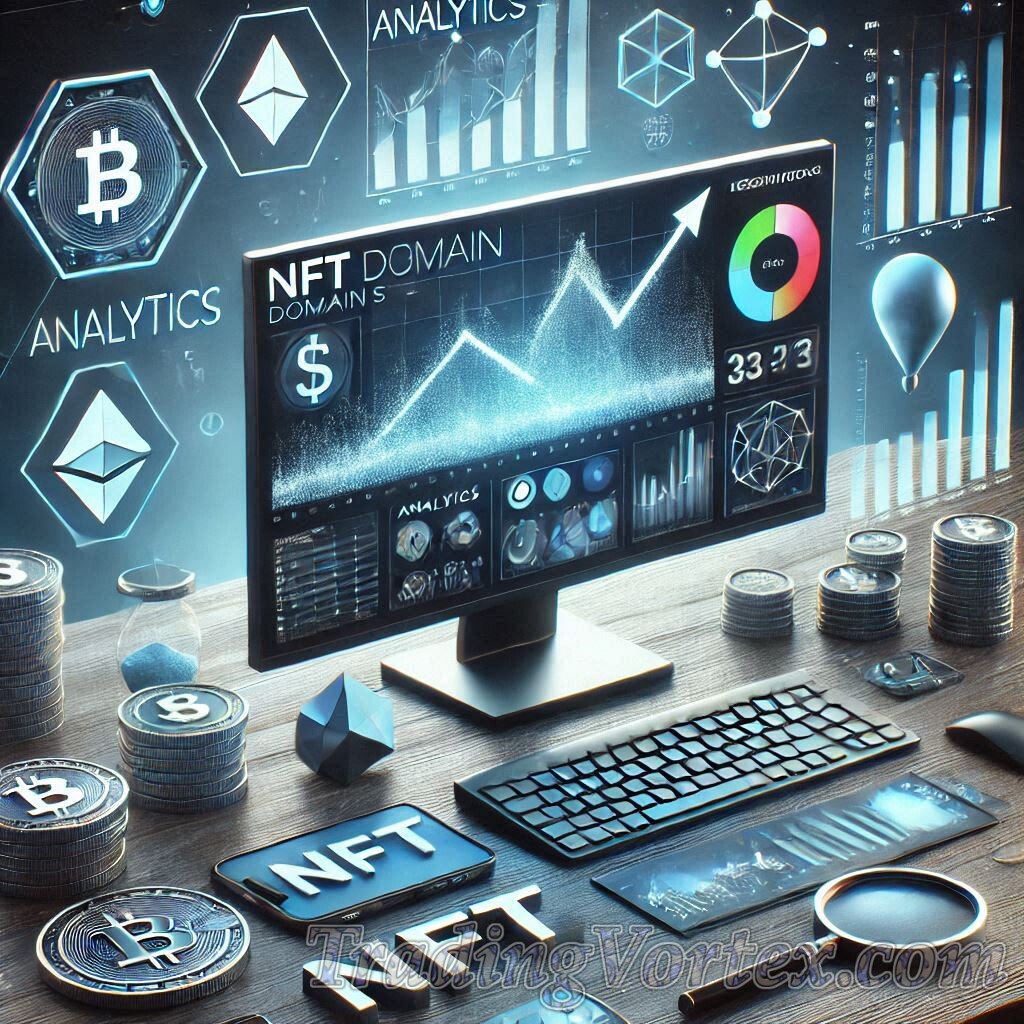
Here are some of the most essential tools that will keep you on top of the game:
- Nansen: Nansen is an on-chain analytics platform that helps you track transactions, wallets, and smart money movements. With its premium plan, you get detailed insights, while the free plan gives you a limited view of the market. Pricing: Free plan available; Premium plans start at $149/month.
- DappRadar: DappRadar tracks NFT marketplaces and provides data on volume, price movements, and engagement across multiple chains. It's great for an overall view of the market, and while the basic features are free, premium features unlock deeper insights. Pricing: Free basic plan; Premium plans available upon request.
- OpenSea: As one of the largest NFT marketplaces, OpenSea offers an extensive range of data on domain prices, sales history, and trends. It’s free to browse, and you can use its analytics to track the performance of NFT domains in real time. Pricing: Free to use; transaction fees apply when buying or selling.
- SimpleHash: SimpleHash is ideal for NFT indexing and analysis, including domain ownership and transaction details. You can access limited features for free, while premium subscriptions unlock advanced reporting and analysis. Pricing: Free plan with limited features; Premium pricing available upon request.
- NFTScan: NFTScan offers real-time data on NFT transactions, sales, and activity. It provides a solid overview of both NFT domain market trends and other NFTs, with free access to basic tracking and a premium tier for advanced analytics. Pricing: Free to use; Premium options for enhanced insights.
- CryptoSlam: CryptoSlam offers detailed financial metrics on NFT projects, including market cap, floor price movements, and sales trends. It provides both free and premium options, with more comprehensive analytics and tracking available via the pro plan. Pricing: Free for basic features; Pro plan starts at $29/month.
- NFTGo: NFTGo is an excellent tool for tracking NFT ecosystem trends, with a detailed portfolio tracker and market insights. You can access basic features for free, but unlocking more robust tools requires a premium plan. Pricing: Free with limited functionality; Premium plans available.
- Rarity.tools: Rarity.tools is perfect for tracking NFT rarity, helping you assess the uniqueness and value of NFT domains. It's free to use and provides detailed rankings and stats to help you understand how domains stand out in the market. Pricing: Free to use.
- NFTNerds: For NFT flipping and market tracking, NFTNerds gives you real-time insights into NFT domain sales, rarity, and trends. The free version offers useful data, but a premium plan unlocks more detailed market tracking tools. Pricing: Free for basic features; Premium starts at $29/month.
- Holder: Holder specializes in tracking NFT holders and their portfolio performance, offering insights into how specific domains are performing across different wallets. It’s a valuable tool for understanding long-term growth potential in NFT domains. Basic features are free, but premium data is available with a subscription. Pricing: Free basic access; Premium features available.
These tools offer a range of capabilities, from tracking prices and trends to offering in-depth analytics. Whether you're interested in monitoring market movements, understanding NFT domain value, or exploring new investment opportunities, integrating these platforms into your toolkit will give you a competitive edge in the NFT domain market.
Conclusion: Are NFT Domains Worth It for Investors and Traders?
So, you've been hearing the buzz about NFT domains and wondering if they’re worth your time and investment. Let's break it down.

Key Takeaways for Decision-Making:
- Market Growth: The NFT market is projected to reach $231.98 billion by 2030, growing at a CAGR of 33.7% from 2022 to 2030.
- Diversification: NFTs are expanding beyond digital art into areas like virtual real estate, gaming items, and music royalties.
- Technological Advancements: Improvements in blockchain technology have increased scalability and reduced transaction costs, making NFTs more accessible.
- Market Volatility: The NFT market has experienced significant fluctuations, with trading volumes and revenues declining in recent times.
The Bottom Line for NFT Domain Investments:
Investing in NFT domains can be lucrative, but it's not without risks. The market is still maturing, and while there's potential for significant returns, there's also the possibility of losses. If you decide to venture into this space, do your homework, stay updated on market trends, and be prepared for the ups and downs. Remember, in the world of NFTs, knowledge and timing are your best allies.
Frequently Asked Questions (FAQs) about NFT Domains in Web3:
Curious about NFT domains and how they fit into the Web3 landscape? You're not alone! Let's dive into some common questions to help you navigate this exciting space.
Q1. What exactly are NFT domains?
NFT domains are unique, blockchain-based domain names that function as both a human-readable address and a non-fungible token (NFT). Unlike traditional domains, they offer decentralized ownership, meaning you have full control without relying on centralized authorities. These domains can be used for various purposes, including simplifying cryptocurrency transactions and hosting decentralized websites.
Q2. How do NFT domains differ from traditional domains?
Traditional domains are managed by centralized entities like ICANN, often requiring annual renewal fees and offering limited control. In contrast, NFT domains are stored on the blockchain, providing permanent ownership without renewal fees. They also enable functionalities like replacing complex wallet addresses with simple, human-readable names.
Q3. Can I use NFT domains for cryptocurrency transactions?
Absolutely! NFT domains can replace lengthy wallet addresses, making transactions more user-friendly. For instance, instead of sending funds to a complex string of characters, you can send them to a simple domain like "yourname.crypto." This feature enhances usability and reduces the risk of errors in transactions.
Q4. Are NFT domains compatible with existing platforms and services?
Compatibility varies depending on the domain provider and the services you intend to use. Some NFT domains are integrated with multiple platforms, allowing for seamless interactions across various dApps, wallets, and exchanges. It's essential to verify compatibility with your desired services before making a purchase.
Q5. How do I purchase an NFT domain?
Purchasing an NFT domain typically involves selecting a domain provider, choosing your desired domain name, and completing the purchase using cryptocurrency. Some platforms offer a one-time registration fee, while others may have annual renewal costs. It's advisable to research different providers to find one that aligns with your needs.
Q6. Can I sell or transfer my NFT domain?
Yes, you can! NFT domains are transferable assets. You can sell or transfer them to others, similar to other NFTs. This feature adds liquidity and flexibility, allowing you to capitalize on market trends or change your domain usage as needed.
Q7. Are there any risks associated with NFT domains?
While NFT domains offer numerous benefits, they also come with risks. The NFT market is relatively new and can be volatile. Additionally, the regulatory landscape is still evolving, which could impact the use and value of NFT domains. It's crucial to stay informed and exercise caution, just as you would with any investment.
Q8. How do I manage my NFT domain?
Managing your NFT domain involves using a compatible wallet to store and interact with your domain. Many NFT domains are compatible with popular wallets, allowing you to manage your domain directly from your wallet interface. Ensure you keep your wallet secure and back up your recovery phrases to prevent loss of access.
Q9. Can NFT domains be used for hosting websites?
Yes, they can! NFT domains can host decentralized websites, providing a censorship-resistant platform for your content. This feature is particularly appealing for those interested in the decentralized web and Web3 technologies.
Q10. Are NFT domains a good investment?
Investing in NFT domains can be promising, but it's essential to approach it with caution. The market is still developing, and while some have seen significant returns, others have experienced losses. As with any investment, conduct thorough research, understand the risks, and consider your financial situation before diving in.
Remember, the world of NFT domains is dynamic and evolving. Stay curious, keep learning, and don't hesitate to ask questions. The more you know, the better equipped you'll be to navigate this exciting space!




































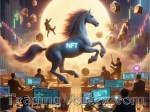

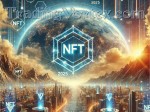
 TradingVortex.com® 2019 © All Rights Reserved.
TradingVortex.com® 2019 © All Rights Reserved.